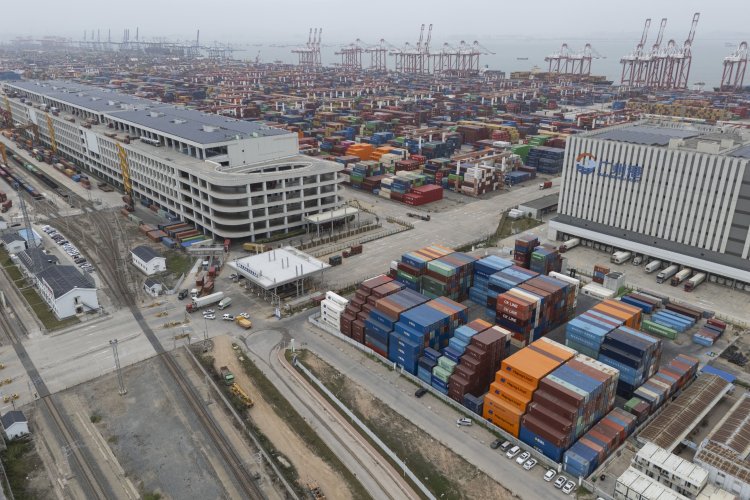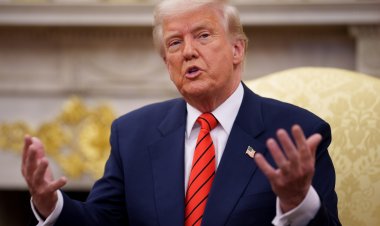Trump's tariffs have rattled Wall Street. Now they're impacting packages.
Low-value packages from China will now be subject to a tariff. This change will impact online shoppers who have shown a growing interest in affordable products.

Trump has decided to revoke a special exemption that previously allowed products under $800 from mainland China and Hong Kong to enter the U.S. without tariffs. This move, part of his trade strategy against Beijing, is affecting the growing population of online shoppers. Starting Friday, Americans will encounter the effects of the president's 145 percent tariff on Chinese goods in the prices of many items they order directly from retailers in China—some of which will clearly show tariff fees on their invoices.
This marks the first clear sign of how tariffs are increasing the costs of everyday items including home goods and clothing, as Americans spend billions with overseas online sellers. This shift poses a significant political challenge for Trump and Congressional Republicans, who campaigned on promises of lowering prices after a rise in inflation under President Joe Biden. It could exacerbate feelings of economic discontent among American voters, who are already concerned about the repercussions of Trump's tariff actions.
Sen. Kevin Cramer expressed his worries on Thursday, acknowledging the delicate situation his party faces regarding tariffs. “I worry, probably as much as anything, that there could be some temporary inflation and that could have a lot of consequences. Hopefully not, but if so, play the long game.”
The White House contends that implementing tariffs on low-value packages from China is a measure to curb fentanyl smuggling, pointing out that cartels have exploited insufficient customs scrutiny. China is a significant source of this illicit drug. “Tens of thousands of Americans are paying with their lives every year for the fentanyl and other illicit drugs that are being smuggled over our borders and through everyday packages," said White House spokesman Kush Desai. "The Trump administration is committed to using every lever of executive power to save American lives and level the playing field for American workers and industries.”
Nonetheless, the Trump administration appears to recognize the political risks posed by this decision. On Tuesday, Trump reached out to Amazon CEO Jeff Bezos in response to a report indicating that Amazon would show how much tariffs add to product prices.
White House press secretary Karoline Leavitt characterized the move as “a hostile and political act by Amazon,” although Amazon clarified that it was simply “considering the idea” for a limited range of products.
Other online retailers are already taking steps in a similar direction. Fast-fashion retailers Shein and Temu, which offer a variety of Chinese-made products to consumers, have raised prices and have openly cited U.S. tariffs as the reason. Temu is highlighting “import charges” that can double the price of items shipped from China while promoting “local” items that are not subject to tariffs. Etsy has encouraged its user base to prioritize domestic buying and avoid imports from China. Additionally, The Knot has chosen to cease offering certain products from China on its wedding site, communicating to customers that the decision was driven by tariff implications.
“New U.S. tariffs will prevent us from shipping China-made products to U.S. addresses after April 24,” The Knot informed its customers. “Some items will be temporarily removed from our website.”
The global shipping firm UPS has recently launched a service that allows customers to see the full costs of their purchases—including tariffs—prior to checkout. This ensures that anyone using UPS can understand the financial impact of Trump’s tariffs when they shop.
“We have a flexible global network that is well-positioned to help our customers navigate shifts in global trade,” stated UPS spokesperson Natasha Amadi. “We will work with our customers as they evaluate their needs and adjust their supply chains.”
Ultimately, it will be up to shipping companies like UPS and FedEx, as well as the U.S. Postal Service, to collect tariff payments on all incoming packages from China and Hong Kong. Tariffs of 145 percent will be applied to packages sent through UPS, FedEx, and other independent carriers, while those using the postal service will have the option to pay either 120 percent of the product’s value or a flat fee of $100 until June 2, when the latter will increase to $200.
The financial burden will rest with the buyers—the de facto importers—unless the retailer chooses to cover the tariff cost upfront. This decision may differ from one business to another.
If a seller does not absorb the tariff, the buyer will either need to settle the payment online, pay upon package delivery, or handle the tariff payment at the post office, FedEx, or UPS location.
Etsy has released guidance for its sellers to help them navigate the new tariffs, recommending that they consider how to price their goods accordingly. Suggestions include incorporating the tariff if the seller plans to pay it or keeping prices lower if the expectation is for the buyer to cover the cost.
“We recommend being transparent with your buyers if you believe a potential sale may be subject to tariffs or if your costs have been changed to reflect the cost of tariffs,” the guide advises. “Consider adding messaging to your shop announcement or in your listing descriptions, or communicating directly with your buyers.”
The complexities involved are precisely why Congress established the “de minimis” exemption for low-value packages nearly a century ago, determining that it was not worth the time or resources to screen and collect duties on such items. This is also why the Trump administration had to pause its initial effort to eliminate the loophole in February when packages began piling up while Customs and Border Protection worked on a new screening system. Subsequently, Trump tasked the Department of Commerce with developing a method for processing low-value packages from China, which they expect to have operational by May.
“U.S. Customs and Border Protection certainly has a huge task on its hand,” a CBP representative noted. “However, the agency is uniquely positioned to implement and enforce the President’s tariffs using all our enforcement and revenue collection authorities.”
In recent years, Chinese retailers have particularly benefited from the tariff exemption.
In 2023, the U.S. imported $66 billion worth of low-value packages, a dramatic increase from $5.3 billion in 2018, as reported by CBP. Notably, China and Hong Kong contributed to 67.4 percent of all de minimis shipments entering the U.S. between 2018 and 2021, with Gen Z Americans driving the demand for affordable clothing and products offered by companies like Shein.
Those consumers will now find the prices for their fast fashion orders increasing, coinciding with the broader economic strains arising from Trump’s elevated tariffs on China, along with a 10 percent baseline tariff on all imports and varying tariffs of 25 percent on sectors such as steel, aluminum, and automobiles.
Trade and economic experts predict that the tariffs imposed on Chinese goods may lead to price increases and shortages beginning in mid-to-late May, as retailers exhaust their current inventories. Treasury Secretary Scott Bessent has remarked that the existing tariffs essentially function as an “embargo,” rendering Chinese goods financially prohibitive.
“You’re going to see some small businesses fail,” warned Scott Lincicome, director of general economics at the Cato Institute, a think tank that advocates for free trade. He explained that while larger businesses have managed to stock up inventory and spread costs across their products, smaller enterprises that rely solely on Chinese goods or those that ship directly to consumers will encounter significant challenges.
“The little guys, they don’t have these options,” Lincicome stated.
Frederick R Cook for TROIB News
Find more stories on Business, Economy and Finance in TROIB business












